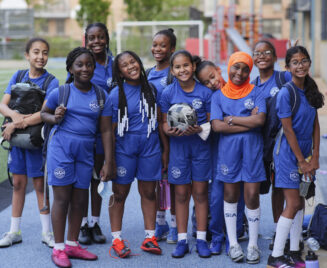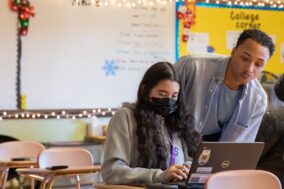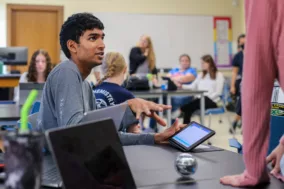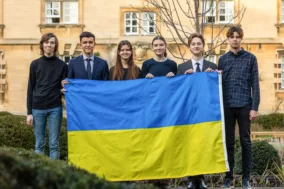Charting a New Course for Academic Success

- A $25 million gift made in April 2023 by Griffin Catalyst to New York’s Success Academy will expand access for 10,000 students over the next five years, a 50% increase over its current enrollment of 20,000. This support builds on an earlier $10 million gift from Ken Griffin in 2018, that enabled Success Academy to open three new middle schools in New York City.
- Founded in 2006 with a single school and 165 students, Success Academy has become New York City’s largest charter-school operator, with 53 schools in underserved neighborhoods across Manhattan, Brooklyn, Queens, and the Bronx. Every single high school graduate in the history of the Success Academy has been accepted by a four-year college, and more than two-thirds have been accepted by a selective or highly selective college.
- The program’s distinctive K-12 approach has achieved levels of performance among its low-income New York City students that surpass those of the most affluent suburban schools. If Success Academy was its own public school district, it would be the highest performing in the state of New York. Since the start of the pandemic, Success Academy students have achieved double (and in some cases triple) the pass rates of their peers on state and national tests, bucking the widespread learning loss across the country.
I am thrilled to support Success Academy’s work to expand access to high-quality education for thousands of students across New York City. I passionately believe that a good education is the on-ramp to the American Dream. Success Academy… has proven time and again that with a culture of excellence and a focus on problem solving and critical thinking, students can bypass the achievement gap and set new standards.
In the fall of 2005, Eva Moskowitz, a longtime New York education advocate, decided it was time to put words into action.
For six years, as an elected member of New York’s City Council and head of its Education Committee, Moskowitz—a native-born New York public-school graduate with a doctorate in history from Johns Hopkins—had been outspoken about the limits of the city’s public education system, arguing that many schools lacked sufficient rigor, and that students needed to be challenged as well as engaged to remain and prosper in class. Many public-school leaders, she said, underestimated the capabilities , and felt—wrongly, in her view—that students from low-income households “cannot achieve at the highest levels.”
In 2005, when she lost to a candidate backed by the teachers union, Moskowitz’s political career ended. Within days, two financial investors who wanted to open a charter-school offered her a job leading it. Moskowitz embraced the offer and for the next eight months worked furiously to create her vision of an academically rigorous alternative to primary and secondary education.
True to its name, the school proved a success from the start, and, with the support of then-Mayor Michael R. Bloomberg—who hailed the original Harlem Success Academy as “the poster child for this country”—the initiative soon began to expand, with three new schools opening in 2008.
Within little more than a decade, Success Academy grew to become the largest public charter-school network in New York City, with an enrollment of 20,000 students in 53 elementary, middle, and high schools in Manhattan, Brooklyn, Queens, and the Bronx.
30,000
Students able to enroll in Success Academy schools in New York City as a result of Griffin Catalyst’s gift
53
Elementary, middle, and high schools make Success Academy the largest public charter school network in New York City
100%
Of graduates accepted to a four-year college for six years in a row
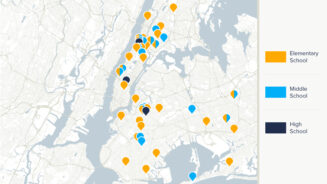
Admitted by random public lottery, Success Academy’s students—mostly children of color from low-income households in the city’s most economically disadvantaged neighborhoods—began to regularly outperform those in the most affluent suburban areas and in gifted-and-talented schools. Indeed, if measured as a district unto itself, Success Academy would be ranked as the single highest performing public-school district in New York State.
For six years in a row, its students’ acceptance rate to four-year colleges has been 100%—meaning that every one of its high school graduates has gone on to an undergraduate institution. Furthermore, nearly two-thirds of those have been accepted at our nation’s most selective colleges, including many Ivy League institutions and dozens of other top colleges and universities across the country.
Every student graduating from Success Academy has also taken at least one Advanced Placement exam in high school.
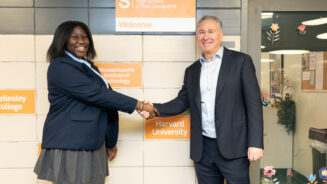
We are not just closing the achievement gap—we’re reversing it. Our largely poor Black and brown kids are outperforming affluent suburban school districts in academic achievement. We’re doing that for $5,000 less per pupil.
At the heart of this remarkable achievement was Moskowitz’s impassioned belief, one shared by the hundreds of Success Academy teachers and administrators, that “all children can thrive and achieve in school, in college, and in life.” Success Academy’s distinctive K-12 approach was developed as a holistic thirteen-year educational trajectory, combining a high level of academic rigor and expectations, deep engagement with students, and an emphasis on data-driven evidence and results.
It's ingrained into our culture. Our fifth-graders know you are already sitting in a math class that is preparing you for pre-algebra because by the time you are fifteen, you’ll be taking an AP class and getting ready for college. That’s just what we do. So it is in our culture; it is in our design. It is something that’s genuinely a part of what we do here every day.
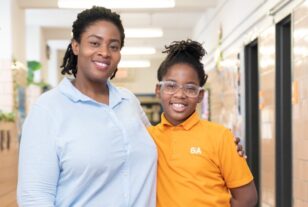
On the one hand, Success Academy students are held to a higher standard of commitment than those at many public schools—including longer school days and a longer school year to help ensure their academic mastery—and, almost without exception, they respond to those higher expectations by rising to the occasion, empowered by a sense of personal agency. In this meritocratic environment where the fruits of success are visible, these students make the most of their opportunity and work hard—charting a path to success in school and far beyond. “Success gave me the tools that I needed to do well academically—not just having knowledge, but having the mindset to do well,” observes Razaq TK, an Academy alumnus who is now getting his master’s degree in robotics at the University of Pennsylvania.
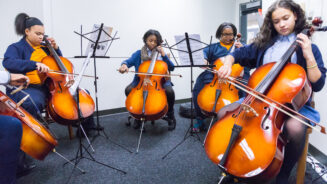
Success Academy students are immersed in a rich array of offerings and activities, notably chess and debate clubs—and a diverse range of cultural classes and programs—dance, art, art history, musical theater, to name a few—that provide a well-rounded learning experience. “We offer art and music and dance and cross-country track and a full complement of offerings,” Moskowitz notes, “because we want kids to enjoy school… to love coming.”
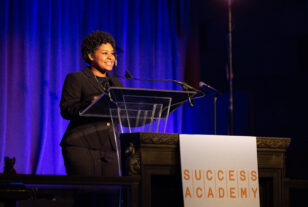
In 2018, Griffin Catalyst provided a $10 million gift to Success Academy to fund the opening of three new public middle schools and sustain the growth of several others.
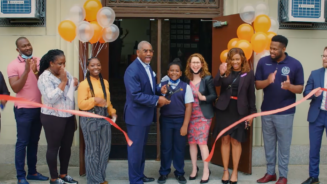
This gift aimed not only to further increase access for New York City students but to help Success Academy become a national model demonstrating the impact and promise of a charter-school approach to public education. “Success Academy is a road map not just for New York but our country,” Ken Griffin declared at the time. “This gift is about momentum.”
We regularly share our groundbreaking curriculum and methods with educators and school leaders across the country. By scaling excellence and reigniting the civic mission of education, Success Academy is leading a movement to reinvent public education.
Nowhere has Success Academy’s accomplishment been more obvious than in the years since the COVID-19 pandemic, when sustained school closures proved devastating to students’ progress across the country.
Almost overnight, Success Academy developed a “Remote 2.0” program designed to mirror its on-campus school program, from a full day of live instruction to electives such as dance, soccer, debate, chess, and art. It also immediately equipped every student with a personal laptop or tablet loaded with the necessary software, while teachers received large-scale monitors allowing them to easily see—and keep track of—all their students at once.
HOW EDUCATION CAN UNLOCK THE AMERICAN DREAM
As a result, Success Academy students have achieved double, and in some cases triple, the examination pass rates of their district peers, bucking the widespread trend of learning loss that impacted districts across the nation. “The world has fundamentally changed, but the benefits and requisites of education have not,” Eva Moskowitz observed during this period. “Now is not the time to throw out standards and give up on kids. Being prepared for life—economically, civically, socially, and emotionally—will be even more important once this pandemic is behind us. As educators and adults, we embrace our job of preparing kids for their academic and life journeys.”
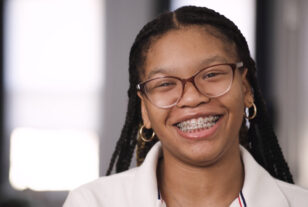

In April 2023, Griffin Catalyst partnered with Success Academy on a second strategic project—this time with a $25 million gift to expand enrollment citywide. This new gift puts Success Academy on the road to accomplishing its next major goal: expanding enrollment by 50% to serve more than 30,000 New York City students, who—like the thousands of orange-uniformed students who have come before—will have opportunities for advancement and growth that they might otherwise never have dreamed of.
50%
Expansion of enrollment enabled by 2023 gift from Griffin Catalyst

